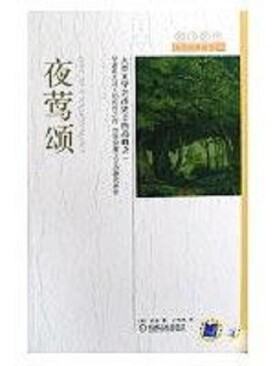夜鶯頌
十九世紀英國詩人約翰·濟慈代表作
《夜鶯頌》寫於一八一九年五月,是十九世紀英國傑出的浪漫主義詩人約翰·濟慈的代表作。該書精選了濟慈諸多名作中優美的不朽的詩篇。同樣身為著名詩人的友人雪萊寫過一段類似的文字:詩人是一隻夜鶯.棲息在黑暗中,用美妙的歌喉,來慰藉自己的寂寞。彷彿濟慈便是《夜鶯頌》中夜鶯的化身,散播優美的歌聲與恆久不變的美,便是濟慈身為詩人的使命。
第一節
My heart aches, and a drowsy numbness pains
My sense, as though of hemlock(1) I had drunk,
Or emptied some dull opiate(2)to the drains(3)
One minute past(4), and Lethe(5)-wards had sunk:
'Tis not through envy of thy happy lot,
But being too happy in thine happiness --
That thou, light winged Dryad(6) of the trees,
In some melodious plot(7)
Of beechen(8) green, and shadows numberless(9),
Singest of summer in full-throated ease(10).
第二節
O, for a draught of vintage(11)! that hath been
Cool'd a long age in the deep-delved(12) earth,
Tasting of Flora(13) and the country green,
Dance, and Provencal song(14), and sunburnt mirth(15)!
O for a beaker full of the warm South(16)
Full of the true, the blushful Hippocrene(17),
With beaded bubbles(18) winking at the brim,
And purple-stained mouth,
That I might drink, and leave the world unseen,
And with thee fade(19) away into the forest dim(20).
第三節
Fade far away, dissolve(21), and quite forget
What thou amongst the leaves hast never known,
The weariness, the fever, and the fret
Here, where men sit and hear each other groan(22);
Where palsy shakes a few, sad, last grey hairs.
Where youth grows pale, and spectre-thin(23),and dies;
Where nut to think is to be full of sorrow
And leaden-eyed(24) despairs;
Where Beauty cannot keep her lustrous(25) eyes,
Or new Love pine at thembeyond to-morrow(26).
第四節
Away! away! for I will fly to thee,
Not charioted(27) by Bacchus(28) and his pards(29),
But on the viewless(30) wings of Poesy(31),
Though the dull brain perplexes(32) and retards.
Already with thee! tender(33) is the night,
And haply the Queen-Moon is on her throne,
Clustered around by all her starry Fays(34);
But here there is no light,
Save what from heaven is with the breezes(35) blown
Through verdurous(36) glooms and winding mossy ways.
第五節
I cannot see what flowers are at my feet,
Nor what soft incensehangs upon the boughs(37),
But, in embalmed(38) darkness, guess each sweet(39)
Wherewith the seasonable month(40) endows
The grass, the thicket(41), and the fruit-tree wild--
White hawthorn, and the pastoral eglantine(42);
Fast fading violets(42) covered up in leaves;
And mid-May's eldest child(44),
The coming musk-rose, full of dewy wine,
The murmurous haunt of flies on summer eves(45).
第六節
Darkling(46) I listen; and for many a time
I have been half in love with easeful Death,
Called him soft names in many a mused rhyme(47),
To take into the air my quiet breath(48);
Now more than ever seems it rich to die,
To cease upon the midnight with no pain,
While thou art pouring(49) forth thy soul abroad
In such an ecstasy(50)!
Still wouldst thou sing, and I have ears in vain --
To thy high requiem(51) become a sod(52).
第七節
Thou wast(53) not born for death, immortal Bird(54)!
No hungry generations(55) treadthee down;
The voice I hear this passing night eas heard
In ancient days by emperor and clown(56):
Perhaps(57) the self-same(58) song that found a path
Through the sad heart of Ruth(59), when, sick for home,
She stood in tears amid the alien corn;
The same that oft-times(60) hath(61)
Charm’d magic casement(62), opening on the foam
Of perilous(63) seas, in faery lands(64) forlorn(65).
第八節
Forlorn(66)! the very word is like a bell
To toll(67) me back from thee to my sole self(68)!
Adieu(69)! the fancy cannot cheat(70) so well
As she is famed to do, deceiving elf(71).
Adieu! adieu! thy plaintive anthem(72) fades(73)
Past the near meadows(74), over the still stream,
Up the hill-side(75); and now 'tis buried(76) deep
In the next valley-glades(77):
Was is a vision, or a waking dream?
Fled is that music -- Do I wake or sleep(78)?
1、hemlock:毒胡蘿蔔精,一種毒藥,人服后,將全身麻木而死亡。
2、opiate:鴉片劑,麻醉劑。
3、to the drains:一飲而盡,drain單數為“一口之量”,複數表示暢飲。
4、One minute past:一分鐘前。
5、Lethe:忘川。希臘神話中冥府之河,名列斯,鬼魂飲了此河之水,便忘卻生前的事。
6、Dryad:林中仙女,指夜鶯。
7、melodious plot:夜鶯唱歌的地方。melodious本不能修飾plot,此處作“轉喻”(transferred epithet)用。第三節中的“leaden-eyed despairs”也屬此類。
8、beech:山毛櫸樹。
9、shadows numberless:numberless後置,與下行ease押韻。第二節中的“forest dim”同屬此類。
10、in full-throated ease:自由自在地放開歌喉。
11、for a draught of vintage:但願有一口酒。for表示願望,第15行同。vintage
12、deep-delved:深挖的。
13、Flora:羅馬神話中的花神,此處指花香。
14、Provencal song:指12世紀普羅旺斯(Provence)地方行吟詩人的愛情詩歌。普羅旺斯位於法國南部,臨地中海。Provencal:Provence的形容詞形式,此處意為“普羅旺斯語的”。
15、sunburnt mirth:這兩個詞形成一個“搭配衝突”(collocative clash),意思是the mirth of the sunburnt people。詩歌中常用這樣的手法以獲得凝鍊的效果。
16、the warm South:此處以warm South代表溫暖的南方所產的酒,在修辭學上稱“換喻”(metonymy)。
17、the blushful Hippocrene:紅色的靈泉。是希臘神話中阿波羅和九繆斯的聖地赫利孔山(Helicon)上的靈泉,飲此泉水可獲得詩的靈感,此處用靈泉的水來指美酒。
18、 beaded bubbles:串珠般的泡沫。
19、fade:退去,隱入。
20、forest dim:幽暗的樹林。dim後置與上行的unseen押韻。
21、dissolve:消溶。
22、groan:呻吟。
23、spectre-thin:鬼影似的形銷骨立。
24、leaden-eyed:目光獃滯無神的。
25、lustrous:有光澤的,光輝的。
26、Or new Love pine at them beyond to-morrow:新歡難持久。因上行中已有否定詞cannot,所以這一行中的否定詞省略。them指her lustrous eyes。beyond to-morrow為誇張用法。
27、charioted:乘馬車,車駕。
28、Bacchus:希臘神話中的酒神乘坐由老虎或山貓拉曳的車子。
29、pards:leopards(豹)的古字。濟慈用豹代替神話中拉曳酒神車子的老虎或山貓。
30、viewless:看不見的(也暗示“詩歌”的高飛,超出凡人的視野)。
31、Poesy:等於poetic fancy。
32、perplexes:困惑。
33、tender:溫柔的。
34、Fays:fairies,仙女。
35、breezes:微風。
36、verdurous:鬱鬱蔥蔥的。
37、soft incense hangs upon the boughs:借用incense(香味)來代表fragnant flowers以獲得更生動的效果。
38、embalmed:香氣撲鼻的。
39、each sweet:每一種香味。
40、the seasonable month:the month of the season,眼前這個季節中的這個月份,這裡指5月。
41、thicket:灌木叢。
42、eglantine:野薔薇的一種。
43、violets:紫羅蘭。
44、mid-May's eldest child:5月中旬最早開放的花,指musk-rose。
45、The murmurous haunt of flies on summer eves:此行中m音的重複,加強了夏夜蟲蠅嗡嗡聲的意味。
46、Darkling:In the dark。
47、mused rhyme:meditated rhyme,苦苦思索出來的詩句。
48、breath:生命。
49、pouring:涌流,傾瀉。
50、ecstasy:入迷
51、requiem:安靈曲。
52、sod:草皮。
53、wast:動詞be第二人稱單數過去式were的古用法。
54、immortal Bird:夜鶯被稱為不朽的鳥,因為她的歌聲是世代不變的。immortal,不朽的。
55、hungry generations:此處暗示devouring Time,吞噬一切的時間。generations,世代。
56、emperor and clown:皇帝和農夫,泛指一切人,不分貴賤。
57、Perhaps:可能,或許。
58、self-same:完全相同的。
59、Ruth:據《舊約·路得記》,路得(Ruth)是摩押女子,大衛王族的女祖先。她在丈夫死於飢荒之後,自願隨婆婆去異邦逃荒,靠拾田裡遺下的麥穗為生。此處濟慈想像她站在異邦的谷田裡,傷心流淚,思念家鄉。
60、oft-times:經常。
61、hath:古英語中have的第三人稱單數形式。
62、Charm’d magic casement:迷住了被魔法(magic)鎮住的城堡窗前(casement)的人。中世紀傳奇和民間故事中常常描寫位於海中被魔法鎮住的城堡。如果有一位勇敢的騎士衝破驚濤駭浪,前來相救,並抵制住任何巫師的引誘而保持自己的品德,他就能贏得被幽禁的公主的愛。casement此處不是指某一城堡或窗戶,而是指被幽禁在城堡中的公主,她站在窗前,遙望大海,等待勇敢的騎士前來搭救,解除魔法。
63、perilous:險惡的。
64、faery lands:仙國。
65、forlorn:remote and far away,遙遠偏僻的。
66、Forlorn:此處有雙重意思:一、與上行末尾的forlorn相同,表示遙遠的過去;二、表示sorrowful,因此這裡的Forlorn表示詩人從夢幻中驚醒,回到可悲的現實。
67、toll:教堂喪鐘的意象承繼high requiem的宗教意象,並預示plaintive anthem。
68、my sole self:孤獨的自身。
69、Adieu:再見,再會。
70、cheat:欺騙。
71、deceiving elf:騙人的小精靈,指fancy。
72、plaintive anthem:哀歌。因詩人已回到現實,故夜鶯美妙的歌聲此刻聽起來也覺得悲哀。
73、fades:褪去,逐漸消失。
74、meadows:肥沃的低草地,草甸。
75、hill-side:小山坡。
76、buried:掩蔽,遮蓋。
77、valley-glades:山谷林間。
78、Do I wake or sleep:當詩人張開想象的翅膀,吟詩作賦時,他很難分清自己是在作詩還是做夢,故詩的末尾有此一問。在“Ode to Psyche”中,濟慈也有此問:
surely dreamt to-day,or did i see
第一節
我的心疼痛,我感到昏昏欲睡,麻木不仁,
好像是飲過毒鴆,
又像是剛剛吞服過鴉片,
開始沉向冥府的忘川。
這並非我對你的福氣有所妒嫉,
而是你的歡樂使我過度欣喜——
你呀,羽翼翩翩的樹精,
在山毛櫸的綠葉與蔭影之中,
在那歌聲悠揚的地點,
你舒展了喉嚨,歌唱著夏天。
第二節
啊,但願有一口美酒,
一口曾在地窖冷藏多年的美酒!
人一嘗就會想到花神,想到蔥綠的酒鄉,
想起舞蹈、戀歌和豐收季節的歡狂。
啊,要是那杯酒帶有南國的熱氣,
紅如人面,充滿靈感之泉的真味,
珍珠的泡沫在杯沿浮動,
能把嘴唇染得緋紅,
我就會一飲而盡,悄然離開塵寰,
隨你隱沒在幽暗的林間。
第三節
遠遠地隱沒,消失,並且忘記
你在林間從不知曉的東西,
忘記這裡的厭倦、焦慮和煩躁不安。
這裡,人們坐在一起長吁短嘆;
這裡,老年癱瘓了,只剩得幾根白髮搖晃,
青年也變得蒼白,瘦削,以至死亡;
這裡,人們一思想就感到傷悲,
就會絕望得兩眼鉛灰;
這裡,美人的雙眸難以保持明麗,
新生的愛情第二天就會凋敝。
第四節
飛去,飛去,我要向你飛去,
不是與酒神同駕豹車而去,
而是乘坐詩神的無形的雙翼,
儘管這頭腦恁地遲鈍、團惑和獃滯。
啊,此刻我終於和你在一起了;
夜,是這般地柔和,
也許月後已經登上寶座,眾星正在四周守望,
但是,這裡卻沒有光亮,
除了幾絲天光,隨風穿過窗枝的隙縫,
穿過綠葉的蔭影和苔蘚的曲徑。
第五節
我看不清什麼花兒在我腳下,也望不見什麼花兒在枝頭掛,
但是,在溫馨的黑夜,我卻能猜想這個季節的每一種芬芳,
那就該有香草、灌木和野果樹的花。
有山楂和野玫瑰的花,
還有早謝的紫羅蘭為綠葉遮蓋,
還有麝香薔薇即將盛開——
那種薔薇是五月中旬的驕兒,流露著酒香,
它是夏夜蚊蠅飛鳴的地方。
第六節
我在黑暗中傾聽你的歌聲,
我多次想到死亡,他可以給人安寧。
我在詩歌里親昵地向他呼喚,
求他把我的生命化為青煙。
現在我越發感到死亡的富麗,
想在午夜安然地與世別離,
但此刻你卻以如此的狂喜
傾吐著你的胸臆,
你將永遠歌唱不息,
我死了就不會再聽見你——
你將唱給一堆草泥。
第七節
永生的靈鳥!你不會死掉,
貪饞的時間不能把你踩倒。
我今晚聽到的聲音,
也曾為古代的帝王和庶民喜聽樂聞;
這同樣的歌聲也許增添過露絲的鄉愁,
使她站在異邦的谷田裡熱淚直流,
這歌聲還常把神異的古堡迷住,
迷住被幽禁在裡面的年輕公主,
她佇立窗旁,凝視著大海的驚濤駭浪,
孤寂的仙境使她悶得心慌。
第八節
孤寂!這個詞兒好似一聲鐘響,
使我又回到我獨自站立的地方。
別了!幻想這個妖精雖能把人欺騙,
但並不像盛傳的那樣靈驗。
別了!別了!你如泣如訴的歌聲逐漸飛逝,
越過附近的草地,越過平靜的小溪,越過山坡;
這個時候它又隱沒在另一個山溝。
這是幻覺,還是夢?
歌聲遠了——我是在睡,還是醒?
英漢對照
[Ode to a Nightingale] John Keats [夜鶯頌] 濟慈(查良錚 譯)
My heart aches, and a drowsy numbness pains 我的心在痛,困頓和麻木
My sense, as though of hemlock I had drunk, 刺進了感官有如飲過毒鴆
Or emptied some dull opiate to the drains 又像是剛把鴉片吞服
One minute past, and Lethe-wards had sunk: 於是向列斯忘川下沉
'Tis not through envy of thy happy lot, 並不是我忌妒你的好運
But being too happy in thine happiness -- 而是你的快樂使我太歡欣--
That thou, light winged dryad of the trees, 因為在林間嘹亮的天地里
In some melodious plot 你呵,輕翅的仙靈
Of beechen green, and shadows numberless, 你躲進山毛櫸的蔥綠和蔭影
Singest of summer in full-throated ease. 放開了歌喉,歌唱著夏季
O, for a draught of vintage! that hath been 唉,要是有一口酒,那冷藏
Cooled a long age in the deep-delved earth, 在地下多年的清醇飲料
Tasting of Flora and the country green, 一嘗就令人想起綠色之邦
Dance, and Provencal song, and sunburntmirth! 想起花神,戀歌,陽光和舞蹈
O for a beaker full of the warm South, 要是有一杯南國的溫暖
Full of the true, the blushful Hippocrene, 充滿了鮮紅的靈感之泉
With beaded bubbles winking at the brim, 杯緣明滅著珍珠的泡沫
And purple-stained mouth, 給嘴唇染上紫斑
That I may drink, and leave the world unseen, 我要一飲而盡而悄然離開塵寰
And with thee fade away into the forest dim. 和你同去幽暗的林中隱沒
Fade far away, dissolve, and quite forget 遠遠地,遠遠隱沒,讓我忘掉
What thou amongst the leaves hast never known, 你在樹葉間從不知道的一切
The weariness, the fever, and the fret 忘記這疲勞,熱病,和焦躁
Here, where men sit and hear each other groan; 這使人對坐而悲嘆的世界
Where palsy shakes a few, sad, last grey hairs. 在這裡,青春,蒼白,削瘦,死亡
Where youth grows pale, and spectre-thin, and dies; 而癱瘓有幾根白髮在搖擺
Where nut to think is to be full of sorrow 在這裡,稍一思索就充滿了
And leaden-eyed despairs; 憂傷和灰暗的絕望
Where Beauty cannot keep her LUSTROUS eyes, 而美保持不住明眸的光彩
Or new Love pine at them beyond to-morrow. 新生的愛情活不到明天就枯凋
Away! away! for I will fly to thee, 去吧!去吧!我要朝你飛去
Not charioted by Bacchus and his pards, 不用和酒神坐文豹的車駕
But on the viewless wings of poesy, 我要展開詩歌底無形的羽翼
Though the dull brain perplexes and retards. 儘管這頭腦已經困頓,疲乏
Already with thee! tender is the night, 去了,我已經和你同往
And haply the Queen-Moon is on her throne, 夜這般溫柔,月後正登上寶座
Clustered around by all her starry Fays; 周圍是侍衛她的一群星星
But here there is no light, 但這兒不甚明亮
Save what from heaven is with the breezes blown 除了有一線天光,被微風帶過
Through verduous glooms and winding mossy ways. 蔥綠的幽暗和蘚苔的曲徑
I cannot se what flowers are at my feet, 我看不出是哪種花在腳旁
Nor what soft incense hangs upon the boughs, 什麼清香的花掛在樹枝上
But, in embalmed darkness, guess each sweet 在溫馨的幽暗理,我只能猜想
Wherewith the seasonable month endows 這時令該把哪種芬芳
The grass, the thicket, and the fruit-tree wild -- 賦予這果樹,林莽和草叢
White hawthorn, and the pastoral eglantine; 這白枳花,和田野的玫瑰
Fast fading violets covered up in leaves; 這綠葉堆中易凋謝的紫羅蘭
And mid-May's eldest child, 還有五月中旬的嬌寵
The coming musk-rose, full of dewy wine, 這綴滿了露酒的麝香薔薇
The murmurous haunt of flies on summer eves. 它成了夏夜蚊蚋嗡營的港灣
Darkling I listen; and for many a time 我在黑暗中里傾聽,多少次
I have been half in love with easeful Death, 我幾乎愛上了靜謐的死亡
Called him soft names in many a mused rhyme, 我在詩思里用盡了我言辭
To take into the air my quiet breath; 求他把我的一息散入空茫
Now more than ever seems it rich to die, 而現在,死更是多麼的富麗
To cease upon the midnight with no pain, 在午夜裡溘然魂離人間
While thou art pouring forth thy soul abroad 當你正傾瀉你的心懷
In such an ecstasy! 發出這般的狂喜
Still wouldst thou sing, and I have ears in vain -- 你仍將歌唱,但我卻不再聽
?To thy high requiem become a sod. 你的莽歌只能唱給泥草一塊
Thou wast not born for death, immortal Bird! 永生的鳥,你不會死去
No hungry generations tread thee down; 餓的世代無法將你蹂躪
The voice I hear this passing night eas heard 今夜,我偶然聽到的歌曲
In ancient days by emperor and clown: 當使古代的帝王和村夫喜悅
Perhaps the self-same song that found a path 或許這同樣的歌也曾激蕩
Through the sad heart of Ruth, when, sick for home, 露絲憂鬱的心,使她不禁落淚
She stood in tears amid the alien corn; 站在異邦的谷田裡想著家
The same that oft-times hath 就是這聲音常常
Charmed magic casements, opening on the foam 在失掉了的仙域里引動窗扉
Of perilous seas, in faery lands forlorn. 一個美女望著大海險惡的浪花
Forlorn! the very word is like a bell 失掉了,這句話好比一聲鍾
To toll me back from thee to my sole self! 使我猛省到我站腳的地方
Adieu! the fancy cannot cheat so well 別了!幻想,這騙人的妖童
As she is famed to do, deceiving elf. 不能老耍弄它盛傳的伎倆
Adieu! adieu! thy plaintive anthem fades 別了!別了!你怨訴的歌聲
Past the near meadows, over the still stream, 流過草坪,越過幽靜的溪水
Up the hill-side; and now 'tis buried deep 溜上山坡,而此時它正深深
In the next valley-glades: 埋在附近的溪谷中
Was is a vision, or a waking dream? 這是個幻覺,還是夢寐
fled is that music -- Do I wake or sleep? 那歌聲去了-我是睡?是醒?
《夜鶯頌》寫於一八一九年五月,是十九世紀英國傑出的浪漫主義詩人濟慈的代表作。當時這位才華橫溢的年輕人身患肺病,且病人膏盲,但他仍嘔心瀝血、筆耕不停。一天清晨,詩人坐在樹下沉思,忽然聽到夜鶯引吭高歌,使他萬感交集,神往不已。他急忙奔進屋去,提筆一氣呵成了這篇瀕死者的絕唱。
相傳,夜鶯會死在月圓的晚上。在午夜0點時,夜鶯會飛上最高的玫瑰枝,將玫瑰刺深深地刺進自己的胸膛,然後發出高亢的聲音,大聲歌唱,直到心中的血流盡,將花枝上的玫瑰染紅。詩的題目雖然是“夜鶯頌”,但是,詩中基本上沒有直接描寫夜鶯的詞,詩人主要是想藉助夜鶯這個美麗的形象來抒發自己的感情。
詩人的心是困頓和麻木的,又在那樣的濁世。這時候詩人聽到了夜鶯的嘹亮歌唱,如同令人振奮的神靈的呼聲。詩人的心被這樣的歌聲感染著,詩人的心同樣也為現實的污濁沉重打擊著。詩人嚮往那森林繁茂,樹陰斑駁、夜鶯歡唱的世界。他渴望飲下美妙的醇香美酒,願意在這樣的世界里隱沒,願意捨棄自己困頓、疲乏和痛苦的身體,詩人更願意離開這污濁的社會。這是一個麻木的現實,人們沒有思想,因為任何的思索都會帶來灰色的記憶和憂傷的眼神。詩人聽著夜鶯曼妙的歌聲,不再感覺到自己身體的存在,早已魂離人間。
夜色溫柔地向四方擴散,月亮悄悄地爬上枝頭,但林中仍然幽暗昏沉;微風輕吹,帶領著詩人通過暗綠色的長廊和幽微的曲徑。曲徑通幽,詩人彷彿來到了更加美妙的世界,花朵錯落有致地開放著,裝點著香氣瀰漫的五月。詩人並不知道這些花的名稱,但詩人*著心靈的啟發,*著夜鶯的指引,感受著深沉而寧靜的世界。詩人沉醉在這樣的世界里,渴望著生命的終結,盼著夜鶯帶著自己在這樣的世界里常駐。
約翰。濟慈(1795-1821),英國浪漫主義時期的傑出詩人。他一生崇拜永恆的美和不朽的真理,作品具有明顯的唯美主義傾向,長期以來被西方評論家看作唯美主義的先驅,濟慈不僅是一位抒情的高手,還是創造藝術美的天才,他在詩歌的形式、格律和語言上做了大膽的實驗,使自己的作品達到臻善臻美的境界。

約翰.濟慈
華茲華斯和柯爾律治是浪漫主義的創始者;拜倫使浪漫主義影響遍及全世界;雪萊透過浪漫主義前瞻大同世。但他們在吸收前人精華和影響後人詩藝上,作用都不及濟慈。 ——王佐良
一百多年來,濟慈的聲譽與日俱增,如今且遠在浪漫派諸人之上。 ——余光中
即使有哪一天大英帝國破裂成無可記認的斷片時,《夜鶯歌》依舊保有它無比的價值:萬萬裡外的星亘古的亮著,樹林里的夜鶯到時候就來唱著,濟慈的夜鶯歌永遠在人類的記憶里存著。 ——徐志摩
